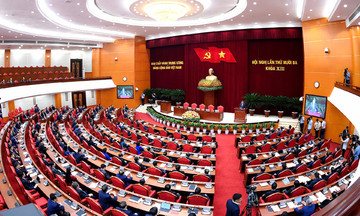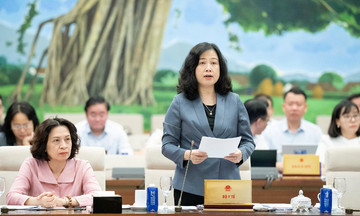Following its merger with Thanh My Loi, Cat Lai ward now spans nearly 20 square kilometers and has a population of nearly 68,000. Designated as a future economic hub for seaports and logistics in Ho Chi Minh City and the southeastern region, the ward currently has 36 major projects underway, 11 of which are publicly funded.
According to Vo Tan Quan, chairman of the Cat Lai ward People's Committee, the new responsibilities of local government require staff with expertise, capable of offering advice and directly handling matters.
Since July 1st, each ward has 4 departments: Public Administration Service Center, Office, Urban Economic Infrastructure, and Socio-Cultural Affairs. After the restructuring, wards absorbed 70% of the district-level responsibilities. The Urban Economic Infrastructure department handles 165 tasks, while Socio-Cultural Affairs manages 85. Each department coordinates with 5 to 6 other departments and agencies.
 |
Staff at Cat Lai ward's Public Administration Service Center assist residents on September 17th. Photo: Le Tuyet |
Staff at Cat Lai ward's Public Administration Service Center assist residents on September 17th. Photo: Le Tuyet
Current regulations allocate an average of 32 staff per ward, with one additional staff member for every 2,000 residents, up to a maximum of 50 for communes and 70 for wards. Cat Lai ward's People's Committee has 60 staff members, a combination of personnel from the two former wards and those transferred from higher levels, placed in roles based on their prior experience.
However, Quan noted that after nearly three months, the ward faces challenges due to a mismatch between staff expertise and their assigned roles, coupled with unfamiliarity with new procedures. Previously, ward staff primarily carried out assigned tasks. Now, they struggle with the proactive role of proposing and implementing state management functions.
Staff transferred from the former Thu Duc City face similar issues. Many were assigned to new areas at the ward level, such as Digital Transformation, Internal Affairs, Urban Planning, Justice, and Investment, but lack the necessary expertise. For instance, a former accountant from the science and technology department was tasked with digital transformation, while a former archivist was assigned to internal affairs.
According to Cat Lai ward leaders, these individuals are competent in their original fields, but their new assignments are unsuitable. Placing them in roles matching their expertise would create redundancy, resulting in a simultaneous surplus and shortage of staff. Urban planning and economic investment are particularly problematic, as the ward lacks specialists in these fields.
"These difficulties put immense pressure on department heads and the People's Committee leadership," Quan explained. They often have to provide extensive guidance or even take over tasks to ensure deadlines are met and prevent backlogs.
 |
Urban planning is an area where many wards lack qualified personnel. Photo: Quynh Tran |
Urban planning is an area where many wards lack qualified personnel. Photo: Quynh Tran
Go Vap ward faces similar issues, with staff shortages or mismatched expertise. Nguyen Huu Tai, vice chairman of the ward People's Committee, cited the example of internal affairs. At the district level, this department was divided into specialized areas: policy, labor, mass organizations, emulation and commendation, discipline, and personnel work. After the restructuring, Go Vap ward received staff experienced only in labor management and archiving.
"Going from a specialized field to managing all these unfamiliar tasks is very challenging," Tai shared.
The ward also lacks specialists in planning, infrastructure, and urban development, all new areas of responsibility. Previously, ward staff handled only house renovation permits; now, they manage construction permits, requiring advanced technical skills, including blueprint analysis, density calculations, and understanding local regulations.
Decree 118 on one-stop administrative procedures mandates a minimum of two years of experience for staff at Public Administration Service Centers. Go Vap ward leaders find this problematic, as center staff primarily guide residents through application submissions, rather than processing them directly. Experienced staff are needed for core tasks within specialized departments.
"Assigning experienced staff to the one-stop shop to comply with regulations leaves departments short-handed, increasing the workload on the remaining staff," Tai said.
Currently, ward leaders and department heads are directly involved in handling tasks, forming internal support groups and utilizing technology to streamline processes. However, long-term effectiveness requires additional specialized and trained personnel.
 |
Hoach Van Duyen, with a background in economics and commerce, was transferred from the former Go Vap district but is now assigned to receive applications at the Go Vap ward Public Administration Service Center. Photo: Le Tuyet |
Hoach Van Duyen, with a background in economics and commerce, was transferred from the former Go Vap district but is now assigned to receive applications at the Go Vap ward Public Administration Service Center. Photo: Le Tuyet
Pham Thi Thanh Hien, director of Ho Chi Minh City's Department of Home Affairs, attributes the mismatch of expertise to the mechanical merging of ward staff and uneven distribution of district personnel. Key areas like land, construction, environment, project management, and finance suffer most, impacting ward operations.
A ward leader in the former District 12 added that districts previously had at least 10 specialized departments, each with accountants, archivists, and specialists. After the mergers, staff were allowed to volunteer for ward positions, leading to some wards receiving mostly accountants. One newly merged ward, formed from 4 previous wards, now has a large staff, with some positions having 4 people with the same specialization.
At a recent City Party Committee meeting, Party Secretary Tran Luu Quang also attributed the ward's staffing issues to "mechanical merging," creating a shortage of qualified personnel. For instance, a former vice chairman of a district, specializing in socio-cultural affairs, might struggle as a ward chairman when signing off on billion-dong public investment projects. "They wouldn't know what to do, especially with inadequate support staff," Quang said.
Quang proposed greater decentralization of city-level tasks, along with clear guidelines. The city will also establish communication channels to address emerging issues from the wards.
To address the workload, staffing shortages, and lack of specialists, Hien stated that the Department of Home Affairs will collaborate with the City Cadre Academy and the University of Economics to provide training and retraining in areas where wards currently lack expertise. These courses will focus on crucial areas like bidding, land valuation, and accounting. Wards are currently compiling lists of staff to facilitate these training programs.
Le Tuyet












